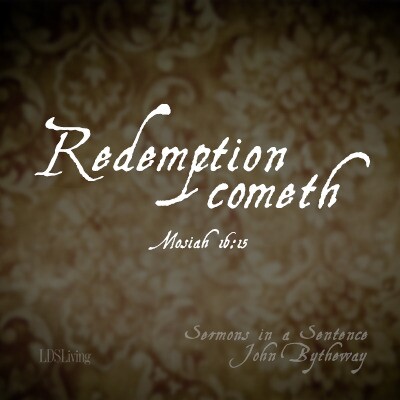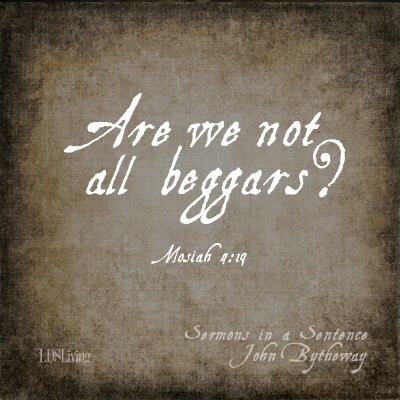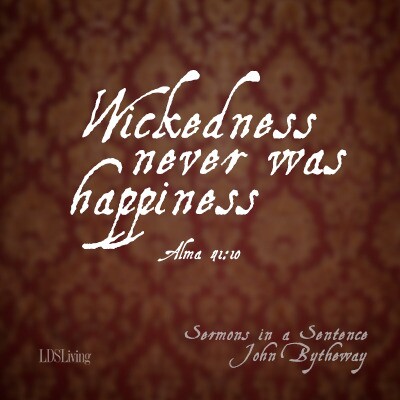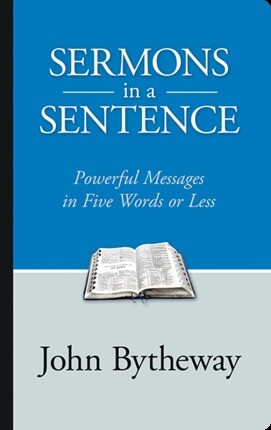Joseph Fielding Smith changed John Bytheway's life in five words when he said, "We read scriptures too fast." Check out these five "sermons in a sentence" from the scriptures that could change your life, too!
1. Redemption cometh

"Teach them that redemption cometh through Christ the Lord, who is the very Eternal Father. Amen." —Mosiah 16:15
Only two words, a prophecy full of hope. “Redemption cometh” is a promise that has been anticipated and relied on by God’s children for millennia. Ancient prophets spoke before Jesus came. Many believed the hopeful words of Abinadi and others who prophesied that “redemption cometh”—a promise that everything that had been spoken about the coming Redeemer for four millennia would, one day, come to pass.
Redemption cometh from sin, redemption cometh from death, redemption cometh for the whole house of Israel. Today, modern prophets speak thousands of years after Jesus’ atoning work was completed. Nevertheless, we often find ourselves wading through difficulty, trials, sin, and other stresses of earth life, all of which are covered by the Atonement. So, even in the latter days, the words redemption cometh bring peace, hope, and a promise of divine relief.
2. Here am I, send me

"And the Lord said: Whom shall I send? And one answered like unto the Son of Man: Here am I, send me." —Abraham 3:27
How can one describe what these five words have meant to every son and daughter of God? Jesus Christ, the greatest of all, volunteered to descend below all things and to suffer beyond anything mortals could suffer, doing for us what we could not do for ourselves.
Interestingly, Abraham and Moses used a similar phrase when the Lord called, but the prophet Isaiah used Jehovah’s exact words, “Here am I; send me” (see Genesis 22:1; Exodus 3:4; Isaiah 6:8). All of us have the opportunity to choose our own words when we are issued difficult callings. How will we answer? President Dallin H. Oaks taught, “Please consider who it is you are refusing or neglecting to serve when you decline a calling or when you accept, promise, and fail to fulfill” (“I’ll Go Where You Want Me to Go,” Ensign, November 2002, 69).
When we plead with our Heavenly Father to send us help as we attempt to magnify a new calling or respond to a new challenge, I believe the Savior responds once again, “Here am I, send me.”
3. Thou art still chosen

"But remember, God is merciful; therefore, repent of that which thou hast done which is contrary to the commandment which I gave you, and thou art still chosen, and art again called to the work." —Doctrine and Covenants 3:10
We are human, and we mess things up, sometimes daily. However, the sacrament table—the formal symbol of the Atonement—is never more than a week away, and our chosen status is not necessarily forfeited by sin. Even the Prophet of the Restoration made mistakes, as this scripture attests.
Sister Julie B. Beck taught, “Sometimes people give up when they have made mistakes and come to believe that there is no hope for them. Some people imagine that they will feel better about themselves if they just leave the restored gospel and go away. It is Satan who puts hopeless thoughts in the hearts of those who have made mistakes. The Lord Jesus Christ always gives us hope” (“Remembering, Repenting, and Changing,” Ensign, May 2007, 111).
Aminadab’s companions were floundering in the darkness when he encouraged them to exercise faith in Christ, “who was taught unto you by Alma, and Amulek, and Zeezrom” (Helaman 5:41)—three chosen missionaries, each of whom had an imperfect past.
4. Are we not all beggars?

"For behold, are we not all beggars?" —Mosiah 4:19
King Benjamin’s speech is a treasure, and this phrase is one of its gems. In only five words, King Benjamin confronts the idea of “works righteousness,” or of salvation by works alone, by asking, “Are we not all beggars?” Not one of us can approach the Lord and demand eternal life based on our own merits. We simply don’t have what it takes. When it comes to our salvation, we cannot earn it or demand it.
The Golden Rule teaches that we should do unto others as we would have them do unto us. But King Benjamin admonishes his listeners to do more—to do unto others as God has done unto them, to be merciful and impart of their substance one to another, just as God has been merciful and imparted salvation to us.
Thus, our works are necessary, but not sufficient. Our righteous works are fruits of the Spirit; they are a result, not a cause, of our being forgiven and converted to Christ. Our works will assist us in becoming what the Lord wants us to become, but, as Moroni taught, we must rely “alone upon the merits of Christ, who [is] the author and the finisher of [our] faith” (Moroni 6:4).
5. Wickedness never was happiness

"Do not suppose, because it has been spoken concerning restoration, that ye shall be restored from sin to happiness. Behold, I say unto you, wickedness never was happiness." -Alma 41:10
Corianton’s misunderstanding of the word restoration gave us perhaps the most widely known and oft-quoted phrase of Alma: a four-word sermon on behavior and consequences with mathematic precision. You cannot do wrong and feel right!
Samuel the Lamanite warned the Nephites of the futility of their behavior with similar clarity when he observed, “Ye have sought for happiness in doing iniquity” (Helaman 13:38). Some may object and suggest that the wicked appear to be plenty happy. Malachi repeated the complaint of some who concluded that it was vain to serve God: “Now we call the proud happy; yea, they that work wickedness are set up; yea, they that tempt God are even delivered” (Malachi 3:15). But their “happiness” isn’t lasting— it’s temporary. As Jesus said, “they have joy in their works for a season” (3 Nephi 27:11, emphasis added).
If it is really true that wickedness never was happiness, then the reverse is also true—righteousness always was.
Get more bite-sized pieces of inspiration in John Bytheway's book Sermons in a Sentence: Powerful Messages in Five Words or Less.
It has been said that the very best sermons have a great beginning, a great ending, and very little in between. The scriptures are rich with "Sermons in a Sentence," single phrases that communicate gospel truths with power.
In this little book, John Bytheway explores forty-six such sermons, brilliant little gems mined from the priceless pages of the standard works.



